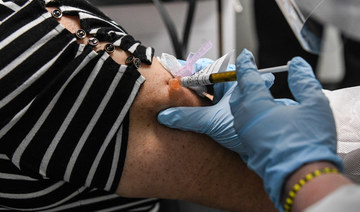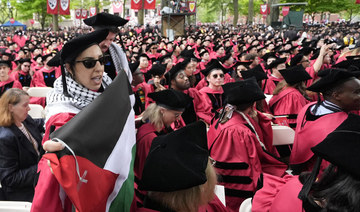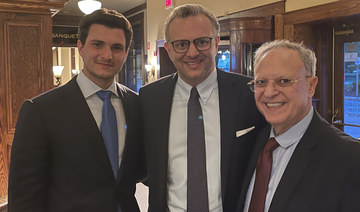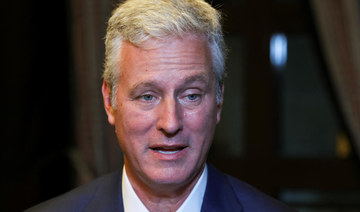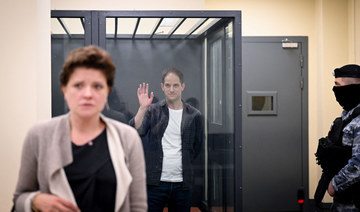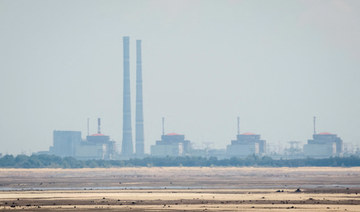KABUL: Taliban fighters seized control on Thursday of a key district in western Afghanistan that includes a major border crossing with Iran, Afghan security officials said, as the insurgents continued their rapid military advances around the country.
In the last week, the Taliban have overrun areas bordering five countries — Iran, Tajikistan, Turkmenistan, China and Pakistan — as foreign forces end their two-decade intervention and the domestic security situation deteriorates.
Pitched battles between Taliban fighters and Afghan government forces were also underway in the northern Balkh province bordering Uzbekistan.
Two senior security officials told Reuters on condition of anonymity that the Islam Qala border crossing with Iran, located in Herat province, had fallen to the Taliban and that Afghan security and customs officials had fled across the border.
Al Alalam TV, Iran’s official Arabic language service, also reported that Afghan soldiers had entered Iranian territory via the border crossing to escape the Taliban.
Tariq Arian, spokesman for the Afghan interior ministry, denied the reports and said the border crossing was still under the control of government forces.
Calls by Reuters to the offices of the provincial governor and police went unanswered.
Another security official said Taliban fighters had seized five districts in Herat without a fight.
Earlier this week, more than 1,000 Afghan security personnel fled into Tajikistan as the Taliban captured most of the northern province of Badakhshan, which also borders China and Pakistan.
CLASHES IN WESTERN PROVINCE
The defense ministry said Afghan government forces earlier on Thursday wrested back control of Qala-e-Naw, capital of the western province of Badghis, which had been stormed by the Taliban on Wednesday.
Hundreds of troops were deployed to the region, the ministry said, adding that fighting was continuing on the fringes of Qala-e-Naw, where insurgents had earlier seized key government buildings in the city including police headquarters.
“The city is fully (back) under our control and we are conducting operations against the Taliban on the outskirts of the city,” Defense Ministry spokesman Fawad Aman said.
The ministry said 69 Taliban fighters were killed in operations on the edge of Qala-e-Naw — the first major provincial capital entered by the insurgents in their latest offensive.
The rest of Badghis province is in Taliban hands. Western security officials say the Taliban have captured more than 100 districts in Afghanistan. The Taliban say they hold over 200 districts in 34 provinces comprising over half the country. Major cities remain under government control.
The insurgents have been gaining territory for weeks but accelerated their thrust as the United States vacated its main Afghan base, effectively ending an intervention that began with the ousting of the Islamist Taliban government in 2001.
Taliban advances have been especially dramatic in northern provinces where they had long been kept at bay.
Stop-start peace talks between the government and insurgents remain inconclusive. Taliban delegations visited Iran on Wednesday and were in Moscow on Thursday.
Defending the decision to pull US forces out of Afghanistan, President Joe Biden said on Thursday he did not expect the Taliban to take over the whole country and that he trusted the Afghan military.
“We’re ending America’s longest war,” he said.
Taliban fighters capture key Afghan border crossing with Iran
https://arab.news/6vagf
Taliban fighters capture key Afghan border crossing with Iran
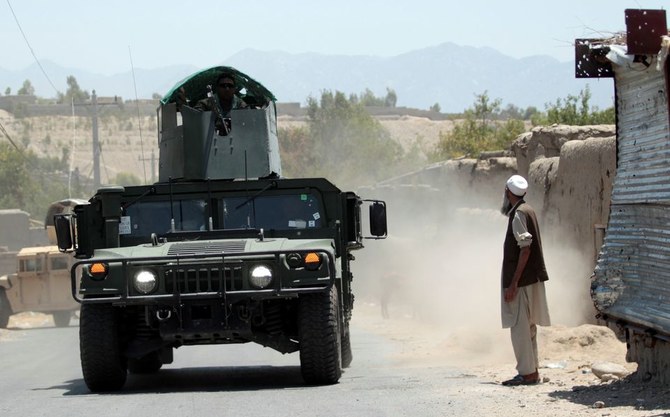
- In last week, Taliban have overrun areas bordering five countries, Iran, Tajikistan, Turkmenistan, China and Pakistan
- Pitched battles between Taliban and Afghan forces underway in northern Balkh province bordering Uzbekistan
HPV vaccines prevent cancer in men as well as women, new research suggests
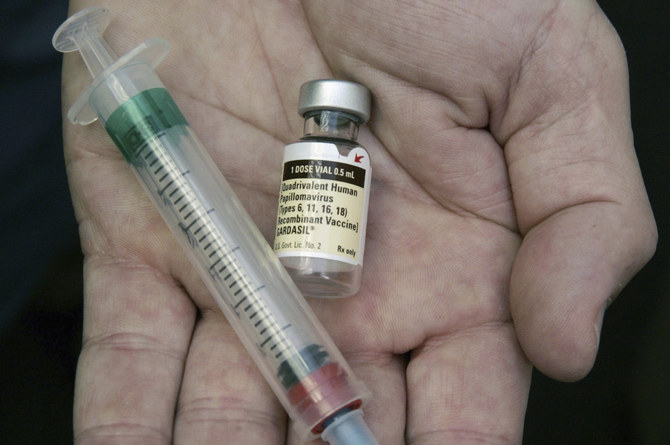
- For the study, researchers compared 3.4 million people of similar ages — half vaccinated versus half unvaccinated — in a large health care dataset
- Research suggests vaccinated men have fewer cancers of the mouth and throat — twice as common in men than in women — compared to those who didn’t get the shots
New research suggests the HPV vaccine is preventing cancer in men, as well as in women, but fewer boys than girls are getting the shots in the United States.
The HPV vaccine was developed to prevent cervical cancer in women and experts give it credit, along with screening, for lowering cervical cancer rates. Evidence that the shots are preventing HPV-related cancers in men has been slower to emerge, but the new research suggests vaccinated men have fewer cancers of the mouth and throat compared to those who didn’t get the shots. These cancers are more than twice as common in men than in women.
For the study, researchers compared 3.4 million people of similar ages — half vaccinated versus half unvaccinated — in a large health care dataset.As expected, vaccinated women had a lower risk of developing cervical cancer within at least five years of getting the shots. For men, there were benefits too. Vaccinated men had a lower risk of developing any HPV-related cancer, such as cancers of the anus, penis and mouth and throat.
These cancers take years to develop so the numbers were low: There were 57 HPV-related cancers among the unvaccinated men — mostly head and neck cancers — compared to 26 among the men who had the HPV vaccine.
“We think the maximum benefit from the vaccine will actually happen in the next two or three decades,” said study co-author Dr. Joseph Curry, a head and neck surgeon at the Sidney Kimmel Cancer Center in Philadelphia. “What we’re showing here is an early wave of effect.”
Results of the study and a second were released Thursday by the American Society of Clinical Oncology and will be discussed next month at its annual meeting in Chicago. The second study shows vaccination rates rising but males lag behind females in getting the HPV shots.
HPV, or human papillomavirus, is very common and is spread through sex. Most HPV infections cause no symptoms and clear up without treatment. Others develop into cancer, about 37,000 cases a year, according to the Centers for Disease Control and Prevention.
In the US, the HPV vaccine has been recommended since 2006 for girls at age 11 or 12, and since 2011 for boys the same age. Catch-up shots are recommended for anyone through age 26 who hasn’t been vaccinated.
In the second study, researchers looked at self- and parent-reported HPV vaccination rates in preteens and young adults in a large government survey. From 2011 to 2020, vaccination rates rose from 38 percent to 49 percent among females, and among males from 8 percent to 36 percent.
“HPV vaccine uptake among young males increased by more than fourfold over the last decade, though vaccination rates among young males still fall behind females,” said study co-author Dr. Danh Nguyen at the University of Texas Southwestern Medical Center in Dallas.
Parents of boys, as well as girls, should know that HPV vaccines lower cancer risk, said Jasmin Tiro of the University of Chicago Medicine Comprehensive Cancer Center who was not involved in the research. And young men who haven’t been vaccinated can still get the shots.
“It’s really important that teenagers get exposed to the vaccine before they’re exposed to the virus,” she said.
German police clear pro-Palestinian protesters from Berlin university

- Activists had occupied several rooms of the Humboldt University’s Institute for Social Sciences in downtown Berlin on Wednesday
BERLIN: German police cleared about 150 pro-Palestinian demonstrators from a Berlin university faculty on Thursday, ending one of a wave of student-led protests across Europe over Israel’s conduct in its war against Hamas.
Activists had occupied several rooms of the Humboldt University’s Institute for Social Sciences in downtown Berlin on Wednesday.
Student Coalition Berlin, the group which organized the protest, called in a statement posted on social media for the university to “take an active role in ending the genocide against the people of Palestine and their decades-long suffering.”
University administrators agreed after talks with protest leaders to let them stay until Thursday evening. But they called in the police when some of them refused to leave, German news agency dpa reported.
Police spokeswoman Beate Ostertag said that, while some of the demonstrators left voluntarily, police officers had to lead others from the building. Police said about 130 people were briefly detained during the operation, in which officers broke through several barricaded doors.
Student protests over the war in Gaza that began in the United States have spread to university campuses in many European countries. In Germany, protests have taken place this week at universities in cities including Munich and Leipzig.
Berlin authorities have taken a tough line against anti-Israeli demonstrations, urging police to step in if demonstrators use slogans that could incite hatred against Jews – taboo in a country marked by the memory of the Holocaust.
“There is no place for hate and anti-Semitism in Berlin and at our universities,” said Burkard Dregger, a lawmaker for the Christian Democratic Union, which leads the Berlin state government.
Promising pipelines and fracking, Trump rakes in millions at Texas fundraisers
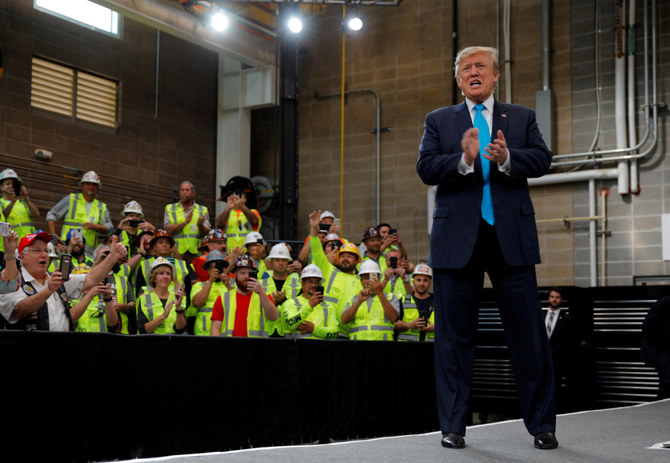
- While the oil and gas industry has boomed under Biden despite increased regulation, they are pushing back against Biden’s ban on fracking on federal land a recent halt in approving new gas export facilities
HOUSTON: Republican presidential candidate Donald Trump raised tens of millions of dollars during a fundraising swing through Texas this week, promising he would support the oil and gas industry by backing new pipelines and restoring fracking on federal land.
Trump has courted support from the energy industry with a pro-fossil fuel and anti-regulation agenda and regularly criticizes President Joe Biden’s policies to accelerate the energy transition toward a low-carbon economy.
The oil and gas industry has boomed under Biden despite increased regulation and the more climate-focused administration, making record profits and pumping more oil and gas than ever before. The industry has pushed back against Biden’s ban on fracking on federal land a recent halt in approving new gas export facilities.
A Houston fundraiser on Wednesday was hosted by oil billionaires Jeff Hildebrand, founder of Hilcorp Energy, the largest closely held US oil firm; George Bishop, founder of GeoSouthern Energy; Harold Hamm, founder of Continental Resources; and Kelcy Warren, head of pipeline firm Energy Transfer Partners.
Trump drew standing ovations when he promised to get more natural gas pipelines built if elected and to restore fracking to areas barred under Biden, said Mark Carr, a Houston entrepreneur who was in attendance. Many oil and gas pipelines were delayed or abandoned under both Trump and Biden’s administrations due to community opposition, legal challenges and lengthy permitting processes.
“He’s going to get energy going again in the United States,” said Carr, who founded the Houston-area Christian Brothers Automotive chain.
Trump said America needs to quit taking Venezuelan “tar” oil and instead use American oil, said another attendee, who declined to be named. The United States has resumed limited imports of Venezuelan crude under Biden for processing at US refineries.
Trump has emphasized tax cuts for the industry, “streamlining” the permitting process, and removing certain regulations, said donor and oil executive Dan Eberhart, who was in Houston for the event. “We can drill our way to energy security and low gas prices,” said Eberhart.
The Houston fundraiser was held by the Trump 47 Committee, a fundraising tie-up between the Trump campaign, the Republican National Committee, a fundraising group that has spent tens of millions of dollars on Trump’s legal fees, and a raft of Republican state parties. The Houston luncheon and a smaller, more intimate roundtable with a group of about 45 executives was followed by a fundraising event in Dallas on Wednesday night.
A Trump campaign official said the Texas swing brought in at least $15 million. Two sources told Reuters the various Texas events took in a total of around $40 million. Reuters was not immediately able to confirm that number.
After a raft of high-dollar donor events across the country, Trump overtook Biden in fundraising last month for the first time.
Meanwhile, the US Senate finance and budget committees on Thursday launched an investigation into Trump’s reported offer to roll back a slew of environmental regulations in exchange for $1 billion in campaign contributions.
The investigation came a week after the top Democratic lawmaker on a US House oversight panel sought information from nine oil companies about reports about “quid pro quo propositions” made by the former president at a campaign event this spring at his Mar-a-Lago resort in Florida.
The Texas events were pricy affairs: Host committee members were asked to pay $250,000 per couple and agree to raise another $500,000, according to the invitations. The chair was asked to donate about $845,000 per couple and raise another $1.69 million.
An after-luncheon roundtable drew Occidental Petroleum CEO Vicki Hollub and Houston entertainment and sports magnate Tillman Fertitta, who owns the hotel where the event was held. They were offered a question-and-answer period with the candidate.
Also in attendance in Houston was North Dakota Governor Doug Burgum, a former Trump rival for the Republican nomination and now a possible running mate, according to another attendee.
Teofilo Lingi, chief operating officer of EK-Petrol, said the former president was “good for the oil industry” and relations with Angola, where his trading and oil exploration company was founded.
Stricter environmental regulations since Trump’s term in office have “made it more difficult for us to import from Angola,” Lingi said, citing customs duties.
Georgian PM says EU official made ‘horrific threat’
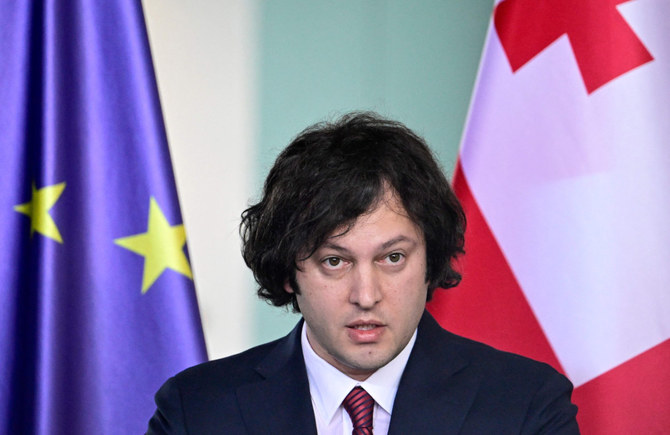
- Oliver Varhelyi, EU commissioner for neighborhood policy and enlargement, says he regrets making the warning
- The EU official says his remarks on the Slovak assassination attempt was 'taken out of context
TBILISI/BRUSSELS: Georgia’s prime minister on Thursday said an EU commissioner had hinted he could face an assassination bid over a controversial law but the official said the conversation had been distorted.
Georgian premier Irakli Kobakhidze said the unnamed commissioner told him to be “very careful,” citing this month’s assassination attempt on Slovakia’s Prime Minister Robert Fico, while discussing the legislation likened by critics to Russian-style laws.
The bill requires NGOs and media outlets that receive more than 20 percent of their funding from abroad to register as bodies “pursuing the interests of a foreign power.”
President Salome Zourabichvili has vetoed the bill, but the ruling Georgian Dream party has the numbers in parliament to override her veto in a vote next week, despite mass protests and sweeping global condemnation.
Critics say the measure mirrors Russian legislation used to stifle dissent, while Brussels warns it is “incompatible” with Tbilisi’s longstanding bid for European Union membership.
Kobakhidze said that “amid open blackmail” by high-ranking foreign politicians, an EU commissioner had called him to outline “measures, which Western politicians could take if the presidential veto is overridden.”
In what Kobakhidze called a “horrific threat,” he quoted the commissioner as saying: “You’ve seen what happened to (Robert) Fico and you must be very careful.”
Fico, a Euroskeptic populist, was shot four times at point-blank range on May 15. Slovak police arrested a 71-year-old suspect who said he had wanted to hurt Fico because he disagreed with government policies.
“As a precautionary measure, I decided to inform Georgian society of that threat,” Kobakhidze added in a statement.
EU Commissioner Oliver Varhelyi said later: “I would like to express my very sincere regret that a certain part of my phone conversation was taken out of context.”
Georgia’s ruling party has faced widespread accusations of derailing the country from its EU membership path and leading the ex-Soviet republic back toward the Russian orbit.
But the party insists it is committed to EU and NATO membership — which are enshrined in the country’s constitution and supported by more than 80 percent of the population.
It has repeatedly accused Western countries of attempts to drag Tbilisi into Russia’s war on Ukraine.
Russia arrests two more top defense officials
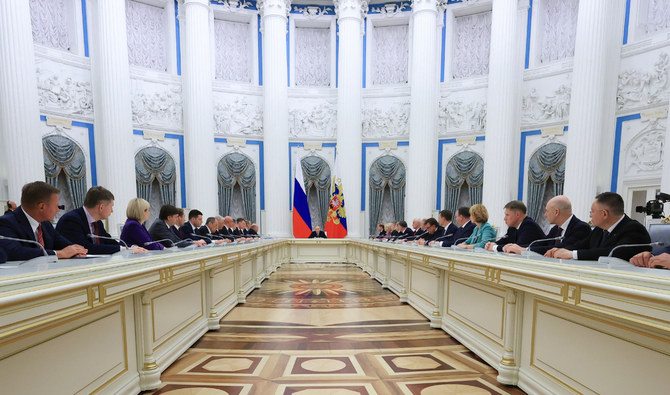
MOSCOW: Russia on Thursday arrested a general and a high-ranking defense official on corruption and “abuse of power” charges — the latest senior military figures to be put behind bars this month.
The Kremlin denied it was carrying out a purge of top army officials, but some of Russia’s influential military bloggers welcomed the arrest of a general they hold responsible for battlefield failures in the two-year offensive in Ukraine.
Moscow’s powerful Investigative Committee said Vadim Shamarin, deputy head of Russia’s General Staff, had been placed in detention on suspicion of “large-scale bribe taking.”
The charge carries a maximum prison sentence of 15 years.
The committee alleged that Shamarin had been taking bribes for years from a factory in the Urals city of Perm, saying he had received 36 million rubles (364,000 euros) in kickbacks in return for boosting government contracts.
It said he had been placed in pre-trial detention.
Later on Thursday, the committee announced the arrest of Vladimir Verteletsky — an official from the defense ministry’s department for ensuring state orders.
It said Verteletsky had “been charged with the abuse of his official powers” and has also been placed in detention.
Investigators accuse Verteletsky of taking a bribe in relation to a government contract in 2022, the first year of Moscow’s offensive.
It said the alleged offense had cost the state “over 70 million rubles” (706,000 euros).
Critics and opposition figures have for years said Russia’s military is riddled with corruption, although its leaders have rarely faced any serious probe or retribution.
The issue burst to the forefront amid failures in the Ukraine offensive, with Wagner paramilitary head Yevgeny Prigozhin accusing Russia’s military bosses — then-defense minister Sergei Shoigu and chief of the General Staff Valery Gerasimov — of corruption on an almost daily basis, saying it hobbled Russia’s combat capacity.
Prigozhin died last year in a plane crash just two months after launching a bloody mutiny in a bid to remove the pair.
The arrest of Shamarin, who was head of the General Staff’s communications directorate, is the latest in an apparent crackdown on some of Russia’s top military officials.
But the Kremlin denied it was mounting a purge.
“The fight against corruption is an ongoing effort. It is not a campaign. It is an integral part of the activities of law enforcement agencies,” Kremlin spokesman Dmitry Peskov told reporters on Thursday.
Putin removed Shoigu earlier this month in a surprise reshuffle, replacing him with economist Andrei Belousov.
A deputy defense minister, Timur Ivanov, and head of the ministry’s personnel, Yuri Kuznetsov, also have been arrested in the last few weeks for bribe-taking.
And Ivan Popov, an ex-commander who was sacked after he criticized Russia’s military leaders for a high casualty rate in Ukraine, was arrested earlier this week.
Some Russian military bloggers welcomed the arrest of Shamarin, saying it was communications breakdowns — caused by a lack of equipment due to corruption — that were behind Russia’s military failures in Ukraine.
“Bribery in the military and security services is state treason,” military blogger Anastasia Kashevarova said in a post on Telegram.
Amid the reshuffle and arrests in Moscow, Russian forces in Ukraine have made their most significant advances on the battlefield in 18 months, with a new major assault on the northeastern Kharkiv region.



